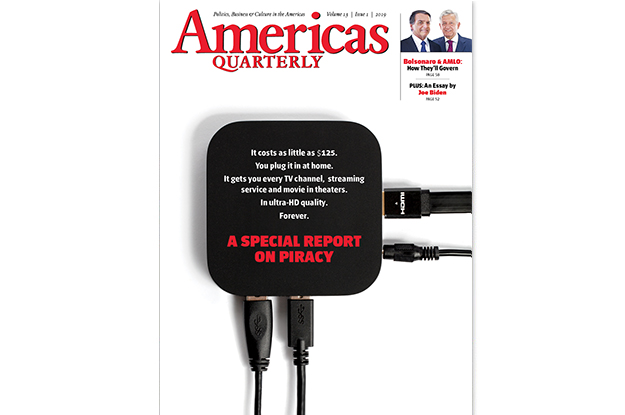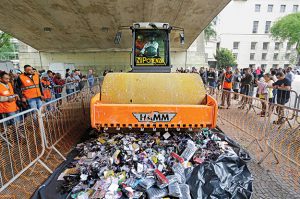This article is adapted from AQ’s latest issue on piracy in Latin America | Leer en español | Ler em português
What a year 2018 was for creative types in Latin America: Mexico’s Alfonso Cuarón might win the best picture Oscar for Roma. YouTube’s three most-played musicians globally were two Puerto Ricans and a Colombian. Artists past (Brazil’s Tarsila do Amaral) and present (Cuba’s Tania Bruguera) were the toast of museums and galleries in New York, London and beyond.
Indeed, Latin America has long punched well above its weight in artistic talent. But the region also does an especially bad job of protecting its filmmakers, composers and designers from existential threats. New technology is making it increasingly easy for criminals, often with links to transnational gangs, to steal or counterfeit their work and resell it for their own profit. Unless governments start to treat the theft of intellectual property more seriously, the region will be deprived of future cultural treasures – and a critical motor for its 21st-century economies.
Some readers will roll their eyes at this. In the world’s most violent and unequal region, piracy is often dismissed as a victimless, even justifiable crime. Stealing a cable TV signal, or buying a knock-off soccer jersey, is perceived as a problem for large, wealthy companies. Can’t they afford a few “lost” customers, especially those too poor to pay full freight?
But as our special report shows, the problem is far more complicated – and insidious. The so-called black box pictured on our cover, an illegal device which allows consumers to watch any televised content – including Netflix’s Roma – for a one-time-only fee of about $125, is a bonafide emergency for the TV and filmmaking industries. Piracy costs Latin America’s software industry 60 percent of its potential revenues, the highest such ratio in the world; as much as a third of the region’s medicines are pirated. Visit any street market and you’ll see many consumers of fake goods are middle-class or wealthy, not poor. Overall, the Latin American market in pirated goods is equivalent to as much as 2 percent of the region’s GDP, according to Brazil’s National Forum Against Piracy and Illegality.
When artists and inventors see their work won’t be protected, the effect on innovation can be chilling. Latin America produces just 2.3 percent of the world’s patents. The region’s so-called orange or creative economy employs an estimated 10 million people, but the potential is surely higher. President Iván Duque wants to grow Colombia’s orange economy from its current 3.3 percent of GDP to make it less reliant on commodities – the global average is 6 percent. Valuing creative workers may help shield Latin America from coming labor trends; it’s hard to imagine robots stealing jobs from Shakira, Bad Bunny or the mariachis in Mexico City’s Plaza Garibaldi.
Indeed, now is the time for governments to act. There is no silver bullet, and punishing consumers seems pointless. But certain measures do help: Internet site blocking has helped reduce pirated TV usage in Spain, while Brazil has cut its dependency on pirated software in half since the 1980s. Countries should press China, the source of two-thirds of the world’s fake products, to crack down on the practice. Increased budgets for customs and police would also help. One step at a time, piracy can be treated as the serious crime it really is.














